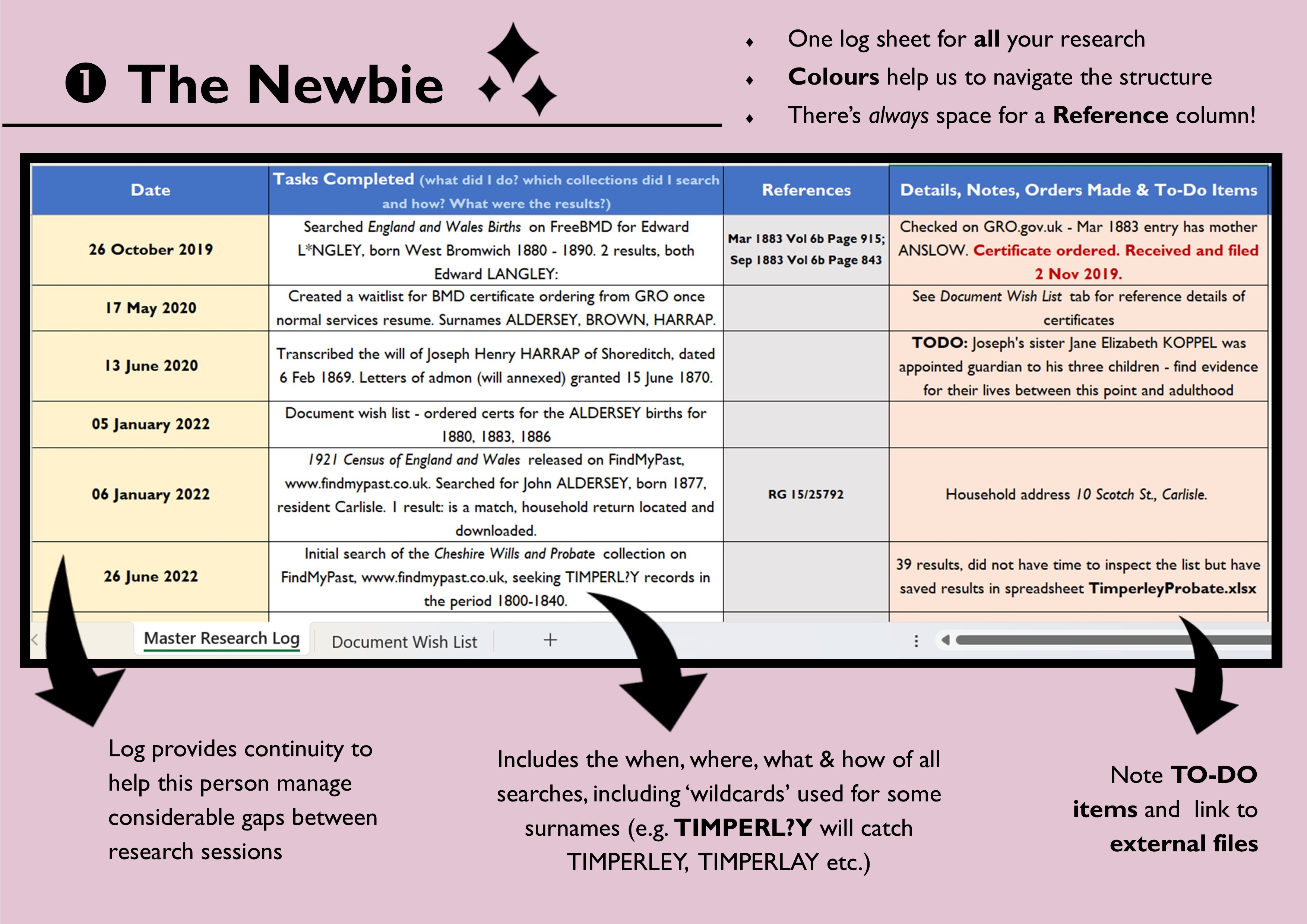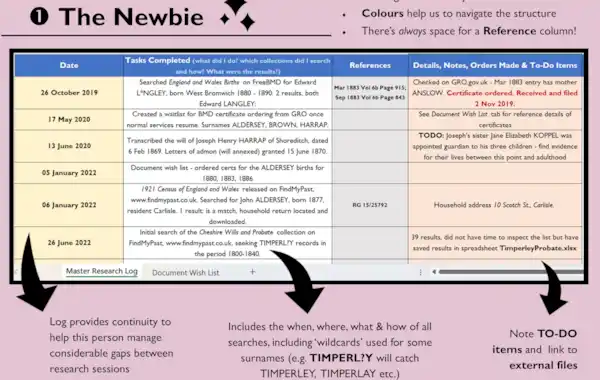04 March 2025
|
You may think you're too busy to keep a family history research log. However we would argue that if you are busy, and only have time to snatch moments here and there to do your family history, that you are too busy NOT to keep a family history log! By incorporating a research log into the way you do your family history, you’ll find that you can pick it up and make the most every moment for family history, whether in the garden or on the go. Dr Sophie Kay shares some essential tips to get you started with a family history research log.
Quick Links
- Learn about family history research logs with Dr Sophie Kay
- How can a family history research log help you?
- Why keep a family history research log?
- What is it essential to include on a family history research log?
- Take a family history skills course with Sophie Kay!
- What lists are useful for family history?
Learn about family history research logs with Dr Sophie Kay
What is a genealogy research log? Why would you create one? And how do you go about doing so? Dr. Sophie Kay is here to explain some of the wealth of family history benefits you’ll enjoy – all with the aid of your research log.
How can a family history research log help you?
Dr Sophie Kay writes:
"You’ve probably heard the story of Theseus and the Minotaur: how the young hero wound his way through a fiendish labyrinth, to slay the fearsome beast hidden in its confines.
"But do you recall how Theseus escaped from the maze, when others had been trapped there forever? He fastened one end of a ball of thread to the labyrinth’s entrance and used it to trace his route from the beginning, following its path on his return.
"When it comes to our family history research, we need our very own ‘ball of thread’ to prevent ourselves from becoming lost amongst the many twists and turns of our research journey. That ball of thread comes in the form of a research log.
"If you’re not used to keeping one then this might sound like an intimidating prospect, but it needn’t be. I promise you it’s entirely achievable and brings a wealth of benefits to your family history! So let’s delve into the WHY of the research log…"
Why keep a family history research log?
When doing family history we find ourselves gathering a vast amount of fascinating information. It takes time and care to find it and we don’t want to waste time by searching for it over and again.
A research log will provide a useful record of what you have done - and what you think about it. A research log is the ideal place to record your work-in-progress family history research, thoughts, successful searches (and why you deduce them to contain correct information) and negative searches (and why it is that you may not have found your ancestor, and where else you may look for them).
Your log is the place to keep those precise details: archival references, the terms you searched on, useful urls. It's also effectively a journal for you to record your reflections on your family history findings, deductions and work-in-progress hypotheses.
A family history research log that includes notes-to-self and reminders where you left off your last research session, and what it is that you wish to start researching next time will be an invaluable genealogy time-saver.
Dr Kay continues:
"Although there are plenty of economical ways to enjoy family history, most of us invest considerable time, energy and money in pursuing those ancestors of ours. We don’t want to waste any of these by repeating a task or purchase unnecessarily.
- "Did you really need to order a third copy of that 1856 marriage certificate, simply because you didn’t remember ordering it the first two times?
- "Does a complex problem have you going around in circles, because you can’t recall where you have and haven’t searched for your ancestor?
"By keeping track of the searches you’ve run, the tasks you’ve carried out, and the purchases you’ve made, your research log helps you to invest your resources in the most effective and appropriate way.
"This added layer of organisation brings clarity to our process, laying out all the components of our research before us so we can see the bigger picture.
"The structure of a good log can also help you to work through a problem. Going back to Theseus and that ball of thread, we sometimes talk about ‘losing the thread’ when we become distracted or our train of thought is disrupted. Just like navigating that labyrinth, the research log ‘ball of thread’ encourages you to keep track of your thoughts and evidence. This contributes to coherent, considered arguments and helps you to find your ancestors, rather than their namesakes!"
What is it essential to include on a family history research log?
Dr Kay explains:
"Let’s talk contents – (The ESSENTIAL contents)…
"As a minimum, include the following essentials in your research log:
- The date of your research session;
- Basic tasks carried out, regardless of whether they succeeded;
- Details of the searches run and any results (including negative searches, where you didn’t find a suitable match);
- References for any records or resources consulted.
"There is no one-size-fits-all when it comes to the style and extent of your log, so you may need to experiment with a few different approaches until you find a system which works for you."
Your research log can be paper or digital, Word document or Excel spreadsheet. Choose the way that works best for you. It doesn’t need to be complicated. Set up a file with a few key columns, for each of the bullet points above.
Please find an example of a simple family history research log, designed by Sophie Kay, below. We ran a full article by Dr Kay on research logs in the February 2024 issue of Family Tree. Research logs are also covered in Dr Kay's forthcoming family history skills course. See further details below.

Take a family history skills course with Sophie Kay!
Join us for Dr Sophie Kay's 4-week online family history skills course - the Research Skills Studio, starting 29 April 2025.
The online course, tutored by Sophie and hosted by Family Tree, will include:
- expert family history webinar tutorials
- group discussions
- and a digital copy of Sophie’s Research Skills Workbook
Tickets cost £109/£69.
Find out more here
What lists are useful for family history?
You may wish to set up other lists and note-keeping systems to help yourself keep organised too, such as:
- A list of what you need to do at your next research session, to help you hit the ground running
- A list of books you’ve bought
- A wish list of books you’d like to read
- A list of records you’d like to follow up when you visit the relevant archive (including the archive reference number in your list, or your research log, to save you having to track it down in the future)
- A list of records or research goals you’d like to follow up with a specific website (for instance if you are paying a membership for just a few months’ access, rather than every month).
Blog last updated 4th March 2025.








